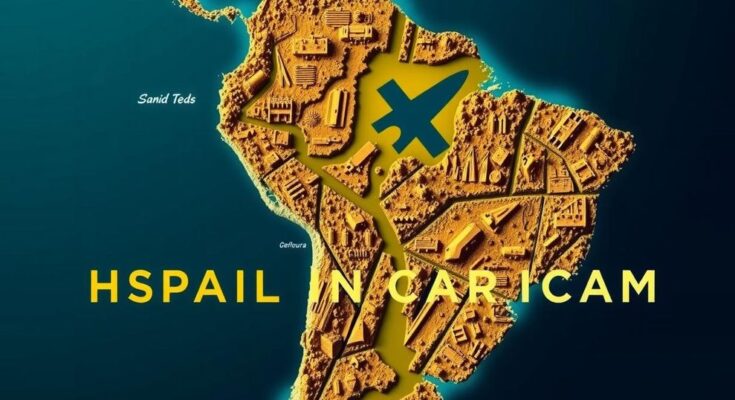Iran, with Hezbollah’s aid, has expanded illicit activities across South America, especially in Bolivia, Brazil, Chile, Colombia, and Paraguay. Argentine officials reported Hezbollah’s concentration in the Triple Border region, with connections to drug trafficking and organized crime. The need for regional intelligence collaboration is emphasized to combat these threats effectively.
The presence of Hezbollah in South America has grown significantly, with Iran backing the Lebanese terrorist group to establish a foothold through various illicit activities in countries such as Bolivia, Brazil, Chile, Colombia, and Paraguay. Argentine Security Minister Patricia Bullrich reported that Hezbollah’s activities are notably concentrated in the Triple Border area comprising Paraguay, Brazil, and Argentina, as well as in Chile’s northern Iquique region. A confidential report shared with Chilean authorities by Bullrich highlighted the Barakat family, known for their logistical and financial support to Hezbollah. Fabián Calle, a professor of International Relations at Argentina’s Austral University, stated, “Hezbollah’s presence in Latin America has been documented since the 1990s.” The organization has successfully leveraged Lebanese diaspora communities, a consequence of the Lebanese civil war, to propagate its influence. Emanuele Ottolenghi, a senior fellow at the Foundation for the Defense of Democracies, corroborated the existence of Hezbollah’s networks in Chile and Bolivia, noting their involvement in drug trafficking activities across South America, which facilitate money laundering operations. Calle elaborated on the increased criminal connections between these regions and Hezbollah, stressing that the Iranian regime exploits weak state control in Latin America for various illicit endeavors. Reports also indicate a potential Hezbollah presence in Bogotá, Colombia, through a cultural center known for promoting Islamic teachings. Such organizations may act as fronts for the organization, interacting with drug trafficking networks and aiding in the erosion of lawful governance. Paraguayan President Santiago Peña acknowledged improvements in intelligence operations within the Triple Border region, suggesting a decrease in terrorist activities. Nevertheless, he emphasized the need for ongoing vigilance due to the inherent risks posed by the intersection of organized crime and terrorism. Ely Karmon, a researcher at the Interdisciplinary Center in Herzliya, Israel, remarked that Hezbollah’s activities are deeply rooted in Lebanese Shiite communities across the globe, notably in regions with free trade zones. Calle called for the urgent collaboration among intelligence agencies and regional security forces to combat drug trafficking and terrorism, underscoring the importance of Argentina’s alert to Chile concerning Hezbollah’s financial activities.
The report discusses Iran’s strategic expansion in South America, utilizing Hezbollah as a proxy to establish illicit networks in various countries. This dynamic is exacerbated by geopolitical factors, the presence of local Shiite communities, and the weakening institutional frameworks in certain regions, which have allowed groups like Hezbollah to thrive. The article highlights intelligence sharing and cooperation as crucial elements in countering the growing threat of terrorism and organized crime in Latin America.
In summary, Hezbollah’s increasing activities in South America highlight a concerning nexus between organized crime, drug trafficking, and terrorism, supported by Iranian backing. The challenges posed by these developments necessitate enhanced collaboration and intelligence sharing among regional governments to effectively counteract the threats posed by these transnational networks. The vulnerabilities in institutions further complicate the situation, underscoring the urgent need for a coordinated response.
Original Source: dialogo-americas.com




